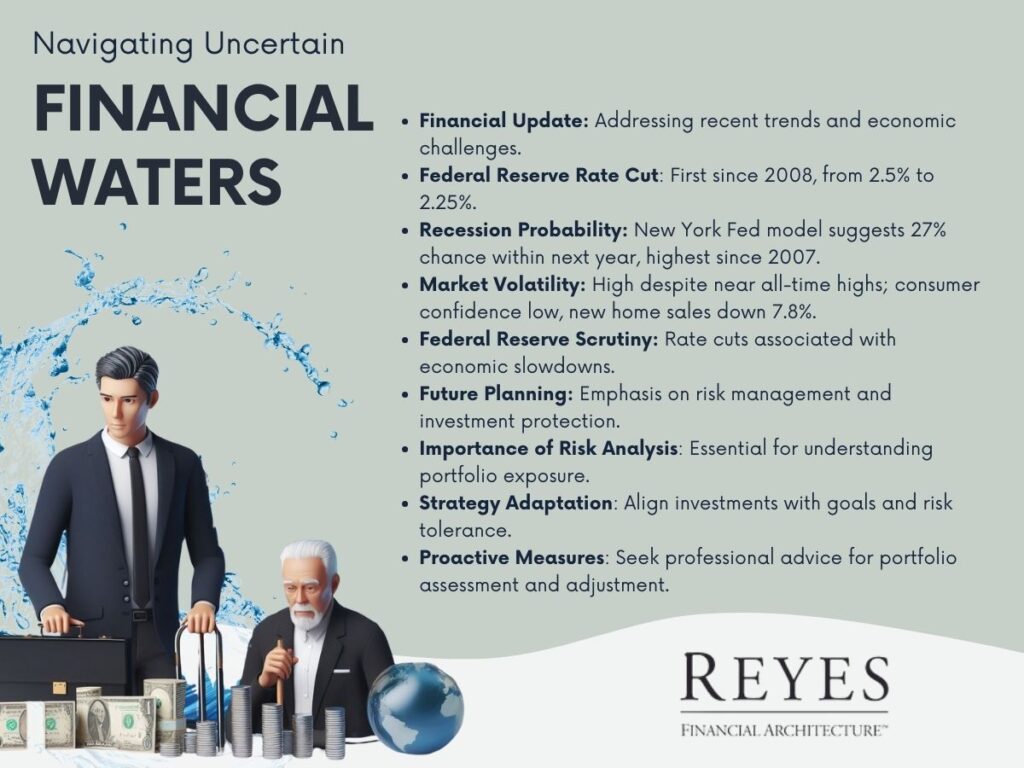It is not if the next recession will happen, it is about when it will happen! David shares his insight about the next recession and ways on how to protect your portfolio.
Will you be comfortable loosing part of your capital? If the answer is NO, then don't wait until it is too late. Contact Reyes Financial Architecture today and schedule a complimentary Second Opinion on your portfolio.
The financial world can be a complex and unpredictable place, and staying informed is vital for making sound investment decisions. In this market update, we'll discuss several concerning trends that have emerged recently and the importance of being prepared for potential economic challenges.

Recent developments in the financial sector have raised concerns among experts. The Federal Reserve recently made its first interest rate cut since the 2008 financial crisis, reducing rates by 25 basis points from approximately two and a half percent to two and a quarter percent. This rate cut is significant because, historically, the Federal Reserve lowers rates when economic growth begins to slow down.
An alarming statistic comes from the New York Fed's probability model, which suggests a 27 percent chance of a recession occurring within the next 12 months. This probability is the highest it has been since early 2007, just before the last financial crisis. While it's crucial not to jump to conclusions, these warning signs underscore the need for caution and preparedness.
Market history has shown us that trends often repeat themselves, even if they don't follow the same script. Several indicators have emerged that should give investors reason for concern. Despite being only about 2 percent away from all-time market highs, there is an air of fragility that cannot be ignored.
Consumer confidence, a significant driver of market performance, has recently reached its lowest level in two years. Additionally, new home sales dropped by 7.8 percent in May, despite historically low mortgage rates.
The Federal Reserve's actions are under scrutiny, particularly their decision to cut rates, which is typically associated with an economic slowdown. It's essential to remember that rate cuts aren't necessarily an indicator of positive market conditions.
In times of uncertainty, it's crucial to have a well-thought-out plan that allows you to protect your investments while ensuring that you can achieve your financial goals. Protecting your assets is just as vital as participating in market growth. Consider it similar to having insurance – you don't purchase it only when a storm is looming, but rather as a safeguard against unforeseen events.
Many investors are unaware of the level of risk they are exposed to in their portfolios. It's essential to conduct a comprehensive risk analysis to accurately quantify your potential risk. Being proactive in managing your portfolio can prevent unpleasant surprises when market conditions take a downturn.
As the financial landscape continues to evolve, adapting your investment strategy accordingly is essential. Seeking professional advice, regularly assessing risk, and ensuring your portfolio aligns with your financial objectives and risk tolerance are fundamental steps.
Avoid waiting until it's too late to make adjustments. Taking proactive measures now can position you for strength and confidence, allowing you to make informed decisions rather than reacting to unforeseen circumstances.
If you have concerns about your portfolio's risk, fees, or retirement income strategy, consider seeking a second opinion from a qualified financial advisor. A proactive approach today can help you navigate the challenges that the market may present in the future.